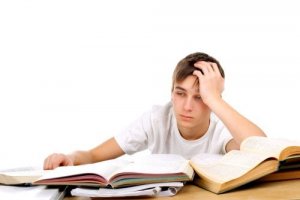Lack of Energy in Adolescents: What to Do?

Have you noticed that your teenager is constantly tired and unable to carry out all of his or her daily activities? Then you might need to do something about it. The truth is, this is a common issue for young people. So, the following article will help you know what you can do about the lack of energy in adolescents. Continue reading to discover risk factors and so great tips for battling fatigue!
Without a doubt, adolescence can be a stressful time. With schoolwork, social stress, personal growth, and all of the changes that take place during this stage… It’s no wonder teens often feel worn out and without energy. As a parent, you should make sure that the amount of tasks your children are facing is appropriate for their age.
Some risk factors like stress and depression can also produce a lack of energy in adolescents. Resting regularly, increasing physical activity, and eating healthy are some of the best ways to reduce fatigue. But don’t worry, we’ll tell you all you need to know below.

Risk factors
There are many things to keep in mind. However, there are several very common reasons that can explain why teenagers are always tired. In fact, the most common risk factors of a lack of energy in adolescents are stress and schoolwork. Teenagers don’t only have a number of obligations in regard to school and extracurricular activities. Many of them also have part-time jobs.
In contrast, there are also possible medical causes behind a lack of energy in adolescents. These include anemia, thyroid problems, or other chronic issues. Hence, mental health problems like excessive stress, depression, and dysthymia can also cause significant fatigue. And so can the side effects of certain medications.
The best ways to combat a lack of energy in adolescents
1. Regulate their rest
Not getting enough sleep is the number one reason that causes children to become tired. This should come as no surprise: If you don’t sleep enough, you’re going to be more tired than usual. In the same way, the more quality sleep you get, the greater your physical and mental performance will be.
It’s easy to see the relationship between lack of sleep and fatigue. And the best solution is to try to regulate your child’s sleeping patterns. It’s true that most teens tend to sleep more on the weekends to make up for the rest of the week. However, this can perpetuate the issue of extreme fatigue even more.
So then, we recommend encouraging teens to go to bed at the same time every night. At the same time, they should avoid staying up too late on the weekends. However, changes in sleep patterns may not be enough to solve the issue of a lack of energy in adolescents. If that’s the case, then not getting enough sleep isn’t the problem.
2. Increase physical activity
While this seems contradictory, getting up and moving around can actually help give teenagers more energy. Many of them spend the entire day sitting at a desk at school, only to come home and do the same.
Some sit down to do their homework, while others spend their time watching TV or playing video games… Something very counterproductive when it comes to regulating sleep. Therefore, it’s best to limit screen time, especially before bedtime.
With that in mind, it’s important to encourage children to get up and move around, preferably outdoors. In the same way, it’s important for teens to avoid becoming overweight, as this can make exercising and sleeping more difficult.

3. Healthy eating
Our final recommendation to deal with a lack of energy in adolescents is to encourage healthy eating. Teenagers need a balanced diet that includes fruits, vegetables, proteins, and carbohydrates.
Limit their intake of artificial juices and soft drinks, sweets, and other foods that are high in sugar and low in nutrition. We know this is easier said than done with kids who ask for junk food. However, it’s one of the best decisions you can make to help boost your children’s energy levels.
In closing, remember that fatigue is very common among adolescents. However, you shouldn’t neglect to consider possible medical factors. A doctor can help to determine the causes of extreme fatigue in adolescents when lack of sleep isn’t the culprit. In any case, we’re sure that following the above advice will contribute to making your teen feel much better.
Have you noticed that your teenager is constantly tired and unable to carry out all of his or her daily activities? Then you might need to do something about it. The truth is, this is a common issue for young people. So, the following article will help you know what you can do about the lack of energy in adolescents. Continue reading to discover risk factors and so great tips for battling fatigue!
Without a doubt, adolescence can be a stressful time. With schoolwork, social stress, personal growth, and all of the changes that take place during this stage… It’s no wonder teens often feel worn out and without energy. As a parent, you should make sure that the amount of tasks your children are facing is appropriate for their age.
Some risk factors like stress and depression can also produce a lack of energy in adolescents. Resting regularly, increasing physical activity, and eating healthy are some of the best ways to reduce fatigue. But don’t worry, we’ll tell you all you need to know below.

Risk factors
There are many things to keep in mind. However, there are several very common reasons that can explain why teenagers are always tired. In fact, the most common risk factors of a lack of energy in adolescents are stress and schoolwork. Teenagers don’t only have a number of obligations in regard to school and extracurricular activities. Many of them also have part-time jobs.
In contrast, there are also possible medical causes behind a lack of energy in adolescents. These include anemia, thyroid problems, or other chronic issues. Hence, mental health problems like excessive stress, depression, and dysthymia can also cause significant fatigue. And so can the side effects of certain medications.
The best ways to combat a lack of energy in adolescents
1. Regulate their rest
Not getting enough sleep is the number one reason that causes children to become tired. This should come as no surprise: If you don’t sleep enough, you’re going to be more tired than usual. In the same way, the more quality sleep you get, the greater your physical and mental performance will be.
It’s easy to see the relationship between lack of sleep and fatigue. And the best solution is to try to regulate your child’s sleeping patterns. It’s true that most teens tend to sleep more on the weekends to make up for the rest of the week. However, this can perpetuate the issue of extreme fatigue even more.
So then, we recommend encouraging teens to go to bed at the same time every night. At the same time, they should avoid staying up too late on the weekends. However, changes in sleep patterns may not be enough to solve the issue of a lack of energy in adolescents. If that’s the case, then not getting enough sleep isn’t the problem.
2. Increase physical activity
While this seems contradictory, getting up and moving around can actually help give teenagers more energy. Many of them spend the entire day sitting at a desk at school, only to come home and do the same.
Some sit down to do their homework, while others spend their time watching TV or playing video games… Something very counterproductive when it comes to regulating sleep. Therefore, it’s best to limit screen time, especially before bedtime.
With that in mind, it’s important to encourage children to get up and move around, preferably outdoors. In the same way, it’s important for teens to avoid becoming overweight, as this can make exercising and sleeping more difficult.

3. Healthy eating
Our final recommendation to deal with a lack of energy in adolescents is to encourage healthy eating. Teenagers need a balanced diet that includes fruits, vegetables, proteins, and carbohydrates.
Limit their intake of artificial juices and soft drinks, sweets, and other foods that are high in sugar and low in nutrition. We know this is easier said than done with kids who ask for junk food. However, it’s one of the best decisions you can make to help boost your children’s energy levels.
In closing, remember that fatigue is very common among adolescents. However, you shouldn’t neglect to consider possible medical factors. A doctor can help to determine the causes of extreme fatigue in adolescents when lack of sleep isn’t the culprit. In any case, we’re sure that following the above advice will contribute to making your teen feel much better.
All cited sources were thoroughly reviewed by our team to ensure their quality, reliability, currency, and validity. The bibliography of this article was considered reliable and of academic or scientific accuracy.
- Lavielle Sotomayor, P., Pineda Aquino, V., Jáuregui Jiménez, O., & Castillo Trejo, M. (2014). Actividad física y sedentarismo: Determinantes sociodemográficos, familiares y su impacto en la salud del adolescente. Revista de Salud Pública, 16(2), 161–172. https://www.crossref.org/iPage?doi=10.15446%2Frsap.v16n2.33329
This text is provided for informational purposes only and does not replace consultation with a professional. If in doubt, consult your specialist.








